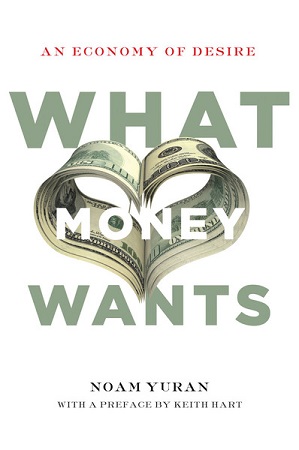A New Book: "What Money Wants: an Economy of Desire", by Noam Yuran
We are excited to announce the publication of a new book by Noam Yuran, a research fellow at the Minerva Humanities Center in Tel Aviv University:
What Money Wants: an Economy of Desire, by Noam Yuran, with a preface by Keith Hart
Stanford University Press, 2014

One thing all mainstream economists agree upon is that money has nothing whatsoever to do with desire. This strange blindness of the profession to what is otherwise considered to be a basic feature of economic life serves as the starting point for this new theory of money. Through the works of Karl Marx, Thorstein Veblen, and Max Weber,What Money Wants argues that money is first and foremost an object of desire. It argues that greed should not be conceived of merely as a subjective pathological relation to money but rather as an objective economic phenomenon, embedded in money as a social object, and it explores the far reaching theoretical consequences that a notion of desire for money has in relation to economic ontology, to the history of money, to contemporary consumer culture, and more.
The book presents a notion of the economy as an impersonal context of action, epitomized in Marx’s conceptualization of the capitalist as a “personification of capital.” The capitalist, in this reading, is a subject who behaves as if money itself wants to accumulate, a figure foretold in the prototypical portrayal of greed in the myth of Midas. This view of money as a mysterious object, issuing an opaque command, sheds new light on the dissolution of the gold standard. Seeing as with the demystification of money during the 20th century consumer commodities were overtly mystified, culminating in the brand name, the book argues that modern fiat money should be conceived as a new form of commodity money. It conceptualizes the brand name as an effect of desire for money in the field of commodities, and presents shopping as an obverse form of finance. For that purpose it elaborates a view of TV commercials as a production site, that reproduces the basic features of Marx’s concept of alienated labor.
Through the work of Thorstein Veblen, the book presents the category of “things that money cannot buy” as a fundamental economic phenomenon, i.e. as the economic articulation of the sublime, that simultaneously necessitates waste and mediates desire for money.
The book posits desire as the historical substance of money that runs throughout Weber’s Protestant Ethic and the Spirit of Capitalism. It thus produces a shift in the interpretation of Weber’s thesis. It refers to the protestant ethic as an economic phenomenon, and by that it mutates the basic question that the thesis addresses. Instead an inquiry of the religious origins of the capitalist profit motive, it reads the thesis as explaining why a divine injunction was necessary for an articulation of desire for money.
From Keith Hart’s Preface:
“When I read this book, I am alternately thrilled and enlightened, confused and frustrated. So will you be. I hope that some of you will stay the course, as I have. You just might be reading one of the formative tracts of our time”.
Table of contents:
Chapter 1
Ontology: The Specter of Greed
Chapter 2
History: Fantasies of a Capitalist
Chapter 3
Mystery: The Materiality of Symbols
Chapter 4
Revelation: Weber’s Midas
Chapter 5
The Economic Sublime: The Fantastic Colors of money
See more details on Stanford University Press Website

